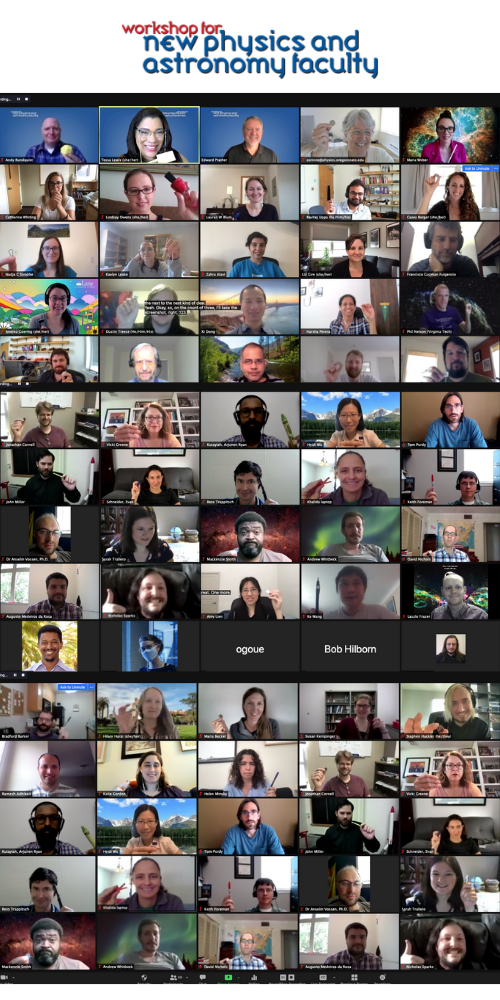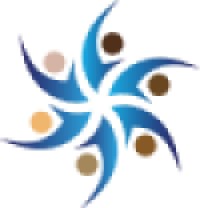
Physics and Astronomy
Faculty Teaching Institute
November 2024 Faculty Teaching Institute
Faculty Teaching Institute, November 7 - November 10, 2024, Washington, DC Workshop.
This 4-day immersive workshop will dig deep into the how and why of helping students learn physics and astronomy, so you can build the type of teaching practice that you want. Additional information and a registration link are available at https://www.physport.org/fti/Events.cfm. Registration closes September 19, 2024.
November 2023 Faculty Teaching Institute
Early Career Four-Year College and University Faculty: Registration for the November 2-5, 2023 four-day National Science Foundation supported Physics and Astronomy Faculty Teaching Institute will open September 5. The Institute will be held in Denver, CO. Additional information and a registration link are available at https://www.physport.org/fti/Events.cfm. The registration deadline is October 10.
June 2023 Faculty Teaching Institute
Early Career Four-Year College and University Faculty: Registration for the June 26-29, 2023 four-day National Science Foundation supported Physics and Astronomy Faculty Teaching Institute is now open. Additional information and a registration link are available at https://www.physport.org/fti/Events.cfm. The registration deadline is March 27.
2022 Physics and Astronomy “New" Faculty Workshop, July 25 - 28, 2022.
The in-person July 2022 Physics and Astronomy “New" Faculty Workshop will be held at the Sheraton Gateway Los Angeles Hotel.
Workshop Materials:
Interactive Physics Demonstrations - Sokoloff/Thornton
Authoring_handout - Gavrin
Session_handout - Gavrin
jittbook - Gavrin
Problem Solving in Intro Courses - Rundquist
Navigating Your Dept Ecosystem - Rundquist
Assessment-Physics - Brent/Felder
Success Strategies-Physics - Brent/Felder
TPS for Problem Solving - Shared Version - Prather/Wallace
TPS-Participants Slide Set - Prather
Lecture-Tutorial_How_To_Guide - Prather
Experiencing and Unpacking the Active Learning Classroom - Prather
Physics Lab Classes - Zwickl
Wiener Presentation - Wiener
Funding Opportunities in NSF's EHR Directorate - Hovis/Sayre
NFW-Upper-Division-Plenary-2022 - Chasteen
Physport Resources-20220727 - McKagan
Introduction to PhET Interactive Simulations - Vieyra
Listening to Students in Upper Division Physics Courses - Wittmann
What APS can help you with - Wittmann
Funds are available to help support registration and travel expenses for participants from departments with severely limited financial resources. To apply for those funds, please contact NFW PI Bob Hilborn (rhilborn@aapt.org).
2021 Physics and Astronomy “New" Faculty Workshop, November 11 - 14, 2021.
The virtual 2021 Physics and Astronomy “New" Faculty Workshop will be held on November 11-14. All faculty members and soon-to-be faculty members are encouraged to attend (no matter how “new you are!). Space is limited so that participants may engage in creative online interactions with experts in teaching physics and their peers. Registration is $45. The registration deadline is Friday, October 22, 2021.
Faculty may register at:
https://portal.aapt.org/Event.aspx?EventKey=NFAC_F21
by Friday, October 22 for primary consideration.
Please note that the capacity of our program is limited by the online meeting information technology requirements to accommodate the Workshop sessions. Generally, we accept registrations in the order they are received, so it is to your advantage to register as early as possible.
June 28 - July 1, 2021 New Faculty Workshop
November 2019 New Faculty Workshop
November 14-17, 2019 - College Park, MD
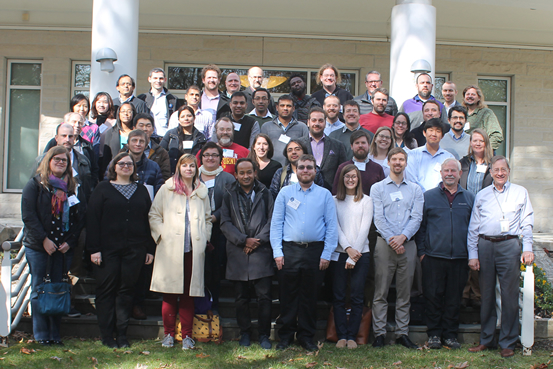
Program:
Presentations:
McCloud-Krimm-Tessema - NSF/MPS Grant Opportunities
Belloni - Optimizing Students' Preparation for Class
Hodapp - Resources for Solving Problems
Wallace - Using Think-Pair-Share (TPS) to promote Quantitative Problem Solving
Carpenter and Rosenblatt - Funding Opportunities in the NSF Division of Undergraduate Education
Dubson - Going Deeper: PhET Interactive Simulations
June 2019 New Faculty Workshop
June 24-27, 2019 - College Park, MD
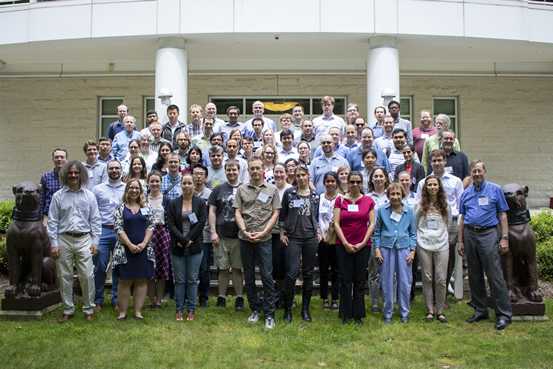
Program:
Presentations:
McCloud-Krimm-Tessema - NSF/MPS Grant Opportunities
Gavrin - Optimizing Students' Preparation for Class
Hodapp - Resources for Solving Problems
Holmes - Using Physics Labs To Teach Experimentation and Critical Thinking
Sayre - Finding Helpful Information About Teaching: PhysPort and ComPADRE
Wiener - Research Funding Opportunities for Early-Career Physics Faculty
October 2018 New Faculty Workshop
October 25-28, 2018 - Holiday Inn College Park
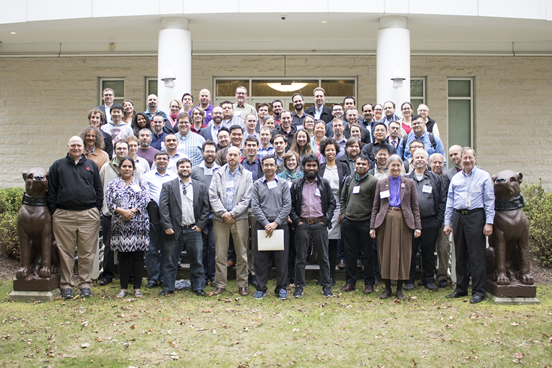
Program:
Presentations:
Holmes - Using Physics Labs to Teach Experimentation and Critical Thinking
Horii - Wise Instructional Choices: Your Roadmap for New Faculty Workshop and Future Teaching
McDermott - The use of guided questioning to promote student learning: Introduction to Tutorials in Introductory Physics
McNeil - The Journey from Traditional Instruction to Active Learning
NSF - NSF/MPS Grant Opportunities
Olmstead - Targeted Instructional Change
Paul - PhETInteractive Simulations: Engaging students and supporting learning
Plisch - Discovering the Resources for Solving Problems
Gavrin - Optimizing Students’ Preparation for Class: Just-in-Time Teaching (JiTT)
Selen - Research Funding Opportunities for Early-Career Physics Faculty
Sayre - Finding helpful information about teaching: PhysPort and ComPADRE
June 2018 New Faculty Workshop
June 25-28, 2018 - Holiday Inn College Park
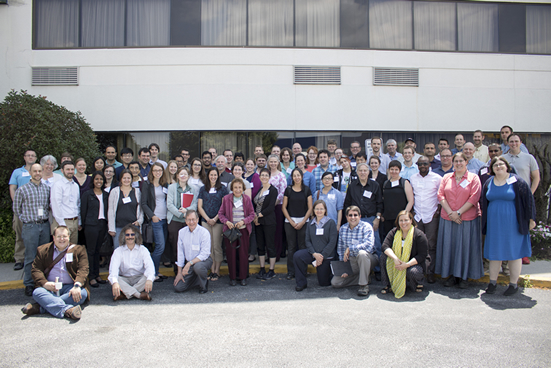
Program:
Presentations:
PhET Interactive Simulations - Perkins
Going Deeper: PhETInteractive Simulations - Perkins
Sutiable PhET Simulation for Freshmen - Perkins
PhET Simulation Challenge Prompt Task - Perkins
Just-in-Time Teaching - Gavrin
JiTT Materials Website - Gavrin
Resources for Solving Problems - Hodapp
Rethinking Introductory Physics Lab Courses - Holmes
Change and Adoption: Scaffolding Your New Faculty Workshop Experience - Horii
Research-based Resources: PhysPort & ComPADRE - Mason, Sayre, McKagan, and Madsen
Highlighting PER -The Journey from Traditional Instruction to Active Learning - McNeil
Grant Opportunities in the NSF Division of Undergraduate Education - Turley and Hovis
Targeted Instructional Change - Olmstead and Holmes
Research in Physics Education - McDermott and Shaffer
Doppler Extrasolar - Prather
Learner Centered Teaching - Prather
Implementation of Lecture Tutorials - Prather and Brissenden
TPS for Problem Solving - Prather
Think - Pair - Share -- Prather
Interactive Lecture Demonstrations - Sokoloff and Thornton
Research Funding Opportunities for Early-Career Physics Faculty - Wiener
What will I do when I get back to the office? - Hilborn Problerm-Solving in Upper-Level Courses - Manogue
Interactive Engagement in Upper-Level Courses - Manogue
Using Physlets and Open Source Physics to Teach Physics and Astronomy - Belloni
November 2017 New Faculty Workshop
November 2-5, 2017 - Holiday Inn, College Park, MD
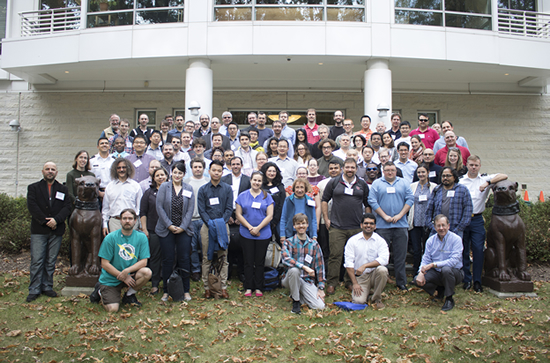
Program:
Presentations:
Doppler Extrasolar
How to get your Students to Prepare for Every Class -- Gavrin
Departmental Ecosystems: Recruitment, Retention, Mentoring, Diversity, Leadership, and More -- Hodapp
Rethinking Introductory Physics Lab Courses -- Holmes
Change and Adoption: Scaffolding Your New Faculty Workshop Experience -- Horii
RBIS Scaffolding Template -- Horii
Interactive Lecture Demonstrations (ILDs): A Research-Validated Strategy for Active Learning in Lecture -- Sokoloff and Thornton
CAE's Tier I Teaching Excellence Workshop -- Prather and Brissenden
Highlighting PER - The Journey from Traditional Instruction to Active Learning -- McNeil
Research in Physics Education: A Resource for Improving Student Learning -- McDermott and Shaffer
Understanding Student's Racial Experiences in Physics -- Turpen and Sawtelle
NSF Career Program -- McCloud
NSF/MPS Grant Opportunities -- Dienes, Krimm, and Spinu
Selected NSF STEM Education Programs -- Hovis
PhET Interactive Simulations -- Dubson
Research-based Resources on PhysPort -- Sayre, McKagan, and Madsen
Learner Centered Teaching in Physics and Astronomy -- Prather
Think - Pair - Share -- Prather
Problem Solving in Introductory Physics -- Heller
TPS for Problem Solving -- Prather
Using Open Source Physics to Teach Physics and Astronomy -- Christian and Belloni
What will I do when I get back to the office?
Participant Think Pair Share Questions
June 2017 New Faculty Workshop
June 12-15, 2017 - Hilton Garden Inn, Greenbelt
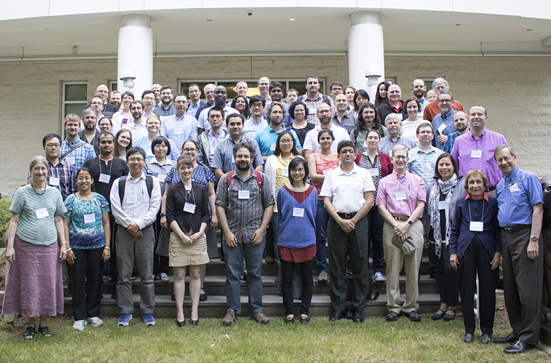
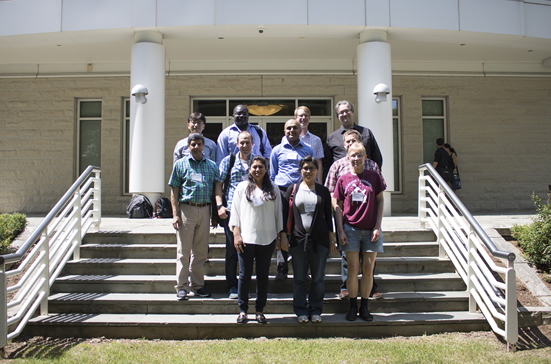
The Physics and Astronomy New Faculty Workshop will be held June 12 -15 in Greenbelt, MD. The workshop introduces the faculty members to effective and easy-to-implement interactive engagement teaching methods as well as other to grant-writing best practices and plans for preparing for tenure and promotion decisions.
Program:
FINAL June 2017 New Faculty Workshop Program
Presentations:
Rethinking Introductory Physics Lab Courses - Holmes
Using Physlets and Easy JAVA Simulations to Teach Physics and Astronomy - Belloni
PhET Interactive Simulations - Dubson
Suggested Physics PhET Sims
How to get your Students to Prepare for Every Class (JiTT) - Gavrin
What will I do when I get back to the office? - Hilborn
Departmental Ecosystems: Recruitment, Retention, Mentoring, Diversity, Leadership, and More - Hodapp
Change and Adoption: Scaffolding Your New Faculty Workshop Experience - Horii
Links for Addtional Information
Research in physics education: A resource for improving student learning - McDermott and Shaffer
Highlighting PER - The Journey for Traditional Instruction to Active Learning - McNeil
NSF/MPS Grant Opportunities
Active Learning with Interactive Lecture Demonstrations - Sokoloff and Thornton
Beyond the First Year - Turley
Research-based resources on PhysPort - Sayre
Background
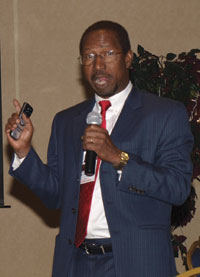
Since 1996, the American Association of Physics Teachers has sponsored workshops designed to help new faculty at research and four-year institutions understand how to become more effective educators and support their quest to gain tenure.
Because of the pressure to establish their credentials in research or other scholarly activities, new faculty may be tempted to postpone or ignore the development of teaching proficiency. They may receive direct or subtle messages suggesting that only a focus on research will result in career advancement, and there is often a lack of mentors or role models who demonstrate dedication and enthusiasm for teaching.
Similar signals are transmitted to graduate students who may be in training for academic careers. Moreover, because the research universities include many of our large public institutions, a large number of undergraduates may suffer as a result of inadequate preparation of new faculty for teaching.
Data suggest that this inadequate attention to teaching, especially in introductory science and math courses, is responsible for driving students away from undergraduate majors in science, mathematics and engineering.
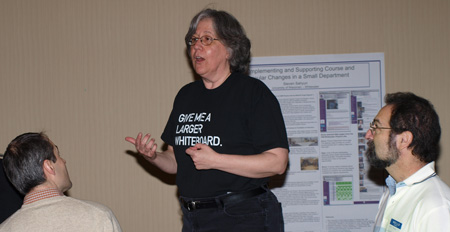
To improve the quality of physics teaching on a national scale, AAPT created the New Faculty Workshop. Each workshop presents a small number of techniques that have proven to be effective in a variety of environments. These tactics can be implemented with minimal time and effort, thus allowing new faculty to devote more of their attention to research and scholarship.
In 2002, the American Physical Society and the American Astronomical Society joined with AAPT to expand the reach of this program. Financial support is provided by the National Science Foundation.
What the Workshop Covers
June 2010 Workshop Program

A group of leading figures in physics education has committed its time and effort to participating in the program on an ongoing basis. Leading physics education researchers tackle topics including:
- the difficulties that students encounter with physics concepts
- how-to strategies for teaching problem solving
- ideas for interactive teaching and peer instruction
- the proper uses of technology in lecture and lab settings
- issues dealing with undergraduate enrollment, curricula, and retention
- case studies on how to teach inclusively so that all students have equal opportunities to succeed
Some of the things that the Workshop offers to new faculty:
- A focus on the introductory course along with lessons that apply to advanced undergraduate and graduate courses
- Presentations surrounding effective teaching ideas that can be reproduced with minimum time and effort
- Exploration of new developments in physics and astronomy curriculum and pedagogy
- Materials provided for immediate application in the classroom
- Facilitated discussions between new faculty, guided by a resource person. Popular topics include: promotion and tenure issues, dual-career couples, time management, and balancing professional and personal activities
- Opportunities to meet with program officers from the National Science Foundation's research and education directorates
How to Participate

Each spring and fall, department chairs at research and four-year institutions are asked to nominate tenure-track faculty in the first few years of their initial appointment. The ideal candidate would have a year or two of teaching experience so that they are aware of the challenges of the first year of teaching.
Participation continues to increase, with numbers reaching nearly 100 at each workshop. The program has grown in popularity, and for the last several years many qualified participants have had to be turned away and placed on a waiting list for the next workshop.
Many department chairs have seen the positive effect that participation in the workshop has had on their new faculty, and have sent more people in subsequent years.
The department chair is asked to verify that the institution will pay for the participant’s travel to the workshop, which is usually held at the American Center for Physics in College Park, MD. A grant from the National Science Foundation pays participant costs for lodging and meals.
For more information about the program, contact AAPT at 301-209-3340, or at programs@aapt.org
|
This program is funded by grants # DUE-0813481, DUE-0121384, and DUE-9554738 from the National Science Foundation. |


